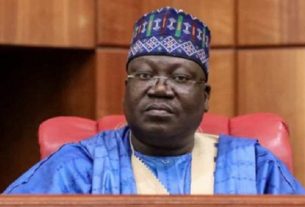Afenifere leader, Pa Reuben Famuyide Fasoranti, has stressed that credible census will strengthen Nigeria’s democracy by providing accurate data.
He spoke in his Akure home while receiving the Ondo State’s National Population Commission’s federal commissioner, Mrs Kemi Iyantan, who had paid him a courtesy visit, and allayed the fear of bloated, inconsistent population figures.
Fasoranti,represented by Bashorun Sehinde Arogbofa, described the biometric initiative introduced newly by the National Population Commission as a welcome development and a necessary step to reposition the country’s planning process.
He said, “This move is long overdue. Planning without data is like walking in the dark.
“A proper census is the foundation of everything development, democracy and distribution of resources”.
Fasoranti commemded the Commission for engaging elders and community leaders ahead of the exercise, noting that such steps were crucial to gaining public confidence.
He prayed for the success of the NPC and encouraged Nigerians to support the initiative for the good of the country.
The NPC is expected to kick off its nationwide digital enumeration in the coming months in what officials describe as the most technologically advanced census in Nigeria’s history.
Iyantan had told the elderstatesman that for the first time in Nigeria’s history, the NPC would deploy biometric capturing and thumbprinting in the conduct of its population and housing census, as part of efforts to enhance accuracy, transparency and eliminate manipulation during data collection.
She said the biometric approach marks a significant departure from previous census methods, describing it as a technological leap aimed at building credibility and trust in the country’s demographic statistics.
Her words, “We are taking a bold step forward. For the first time, we’re introducing biometric capturing and thumbprinting into the census process. This will help us avoid identity duplication, fraud and inflated figures that have plagued past exercises.”
Iyantan explained that the Commission’s new digital model is designed not only to count people, but also to identify and document their specific needs, such as access to schools, hospitals and other social infrastructure.
Her words, “When we know where the needs are, government can make informed decisions. With accurate data, we can move from guesswork to targeted development”.
She said that Ondo State Governor Lucky Aiyedatiwa had given full support to the exercise, granting approval for field operations across all 18 local government areas of the state.
“We have briefed the governor, and he has given us the green light to begin enumeration. The state has already been mapped into Enumeration Areas (EAs) to ensure complete coverage,” she said.
She said that the Commission’s mandate extends beyond census activities, encompassing civil registration such as birth and death records, which she described as critical to national planning and resource allocation.
“Our responsibility goes from the cradle to the grave. Proper data helps the government plan education, healthcare, housing and more effectively,” she said.
Iyantan noted that the Commission deliberately reached out to Pa Fasoranti due to his moral influence and leadership in Yoruba land, saying his support would encourage wider public participation.





